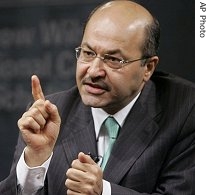2007年VOA标准英语-Iraqi Deputy PM Urges Continued US Engagement(在线收听)
Washington
14 May 2007
Iraq's Deputy Prime Minister says his country faces serious challenges, but that the United States and the international community have a vital role to play in helping forge a solution. VOA's Michael, Bowman reports from Washington, where Barham Salih addressed a gathering of news media and academics.
 |
| Barham Salih gestures while addressing a forum at the Ronald Reagan Building in Washington, 14 May 2007 |
Salih says Iraqis are paying close attention to the ongoing debate in the United States about military operations in his country, and are acutely aware that public opinion polls show Americans increasingly impatient for signs of progress in Iraq.
He said the United States must understand that Iraq, which for decades was traumatized by a dictator, brought to its knees by wars, and hobbled by sanctions, is now enduring what he termed a constant "tornado of terrorism."
"Think of September 11 happening over and over again to your country, and expecting in the midst of such a tough battle against a lethal, ruthless, determined enemy, called terrorism, to think about building institutions of democracy, respect for law and human rights, and meeting benchmarks," said Salih.
Salih said he and other members of Iraq's leadership must do a better job of governing. But, speaking at the Woodrow Wilson Center, a non-partisan public policy group that focuses on international affairs, he suggested Iraqi society is showing far more strength, resolve, and forbearance in confronting violence than it gets credit for in world opinion.
"People can talk about civil war in Iraq. People can complain about a sectarian divide in Iraq. But there is another way of looking at it: any other society that had been subjected to this type of barbaric onslaught day in and day out would have been in an all-out civil war. If anything, it is remarkable that Iraq has not slid into an all-out civil war," he said.
The deputy prime minister met with Bush administration officials as well as key legislators on Capitol Hill. He said he is alarmed by the increasingly partisan tone to the debate in the United States over continued military operations in Iraq.
Salih said there are positive signs the ongoing buildup of U.S. forces in Iraq is helping bring stability to certain areas of the country, and noted that tribal factions in one province have taken up the fight against al-Qaida terrorists.
He also said Iraq's insurgency cannot be defeated by military means alone. But he insisted a political solution among Iraqis must have the backing of regional powers in the Middle East and the international community. Until such a day comes, he said, most Iraqis who believe in democracy want U.S. forces to remain in their country.
"Stability in Iraq is contingent upon a domestic pact among Iraqis. A grand bargain among Iraqis to take on the challenge of defeating extremism and terrorism," said Salih. "But that can only work if there is a regional international pact supporting this domestic pact. It cannot be done alone by us. It cannot be done alone by the outsiders."
Salih spoke as Iraqi lawmakers allied with radical Shiite cleric Muqtada al-Sadr continue to press legislation that would establish a timetable for withdrawing U.S. forces. Observers in Baghdad say it is not clear whether the measure will come up for a vote, and is unlikely to pass if it does.
Several Republican congressional allies of President Bush have said that, if Iraq formally requests a pullout of U.S. troops, the United States will comply.